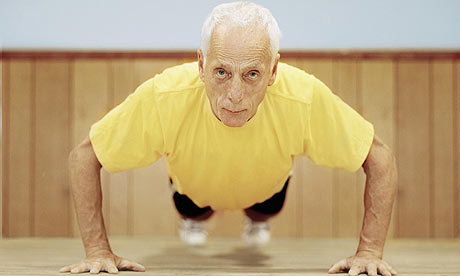Stressful events linked to fall risk for older men
Loss of a loved one, serious financial trouble and other major stressful life events could set older men up for a fall, researchers say.
In a new study, men aged 65 and older who experienced stressful events were more likely than men who didn’t to fall during the subsequent year, and multiple stressful events raised men’s chances of taking a tumble even further.
Once researchers adjusted for other factors, however, stressful events did not increase the men’s risk of breaking a bone.
One in three adults over age 65 falls each year in the U.S., according to the Centers for Disease Control and Prevention. Past research has shown links between risk of falling and a person’s physical activity, medications, symptoms of depression and diseases such as Parkinson’s or diabetes.
The current male-only study took those factors and others into account, as well as the strength of the men’s social networks and their involvement in activities.
“I thought the increased risk of falling would be explained away by frailty or medication, for example,” said lead author Dr. Howard Fink, an internist at the Veterans Affairs Medical Center in Minneapolis.
 Instead, Fink’s team saw a clear link between increased stress and fall risk. This means “stressful life events may have particularly direct health consequences to the person going through the event,” Fink told Reuters Health.
Instead, Fink’s team saw a clear link between increased stress and fall risk. This means “stressful life events may have particularly direct health consequences to the person going through the event,” Fink told Reuters Health.
And a lack of social support and connections made things worse: the lower a participant scored with regard to social networks and involvement, the higher his risk of falling. Fink said this secondary finding needs further investigation.
For the study, he and his team gathered data from 4,981 men previously enrolled in a national study designed to measure osteoporotic bone fractures. Nearly all of the men lived outside of nursing homes. Between 2005 and 2006, the participants were asked to recall stressful events during the previous year, and were then followed for the next year to collect data on falls.
Life events and stress: do older men and women in Malaysia cope differently as consumers?
Abstract
The study of major life events and their effects on well-being has considerable relevance for scientific disciplines and policy making in understanding the consumer behaviour of older people. There is evidence of differences in reactions to and coping with stress between males and females but relatively little knowledge about such gender differences amongst older people, especially in middle-income countries. This study of older Malaysians looked at both coping strategies and gender differences in reactions to stress when people are confronted with certain life events. Seventeen major life events were used in interviews with 645 respondents aged 50 years or older in five major urban areas in Peninsular Malaysia. The analysis showed older women tended to experience higher levels of chronic stress than older men. They also had more health problems, had lower levels of self-esteem and were less satisfied with life. Whilst the results showed little support for gender differences in coping behaviours, stress had a significant influence on the way older men and women change store preferences. A hypothesis that older women would use more emotion-focused coping strategies was not supported. Knowledge of how older Malaysians cope with life events and stress and especially in this instance with regard to consumption behaviour, is likely to be of considerable academic and policy related interest.
###
Ong FS, Phillips DR, Chai ST.
Source
Nottingham University Business School, The University of Nottingham Malaysia Campus, Jalan Broga, 43500 Semenyih, Selangor, Malaysia.
PMID:
23652824
[PubMed - indexed for MEDLINE]
Among the stressful life events the researchers considered were the death of a spouse, partner, child, friend or pet, as well as separation from a relative, change of residence, serious financial trouble, serious accidents or illnesses and loss of the ability to pursue a hobby.
 About 6 in 10 of the men had experienced at least one such event in the previous year.
About 6 in 10 of the men had experienced at least one such event in the previous year.
Fink’s team found that overall, men’s risk of falling was 33 percent higher if they had experienced a stressful event compared to the men who had not. And men with multiple stressful events were 68 percent more likely to fall than men with none.
Of the men with just one event, 30 percent fell during the follow-up year, while 40 percent of men with three or more events fell, according to findings published in Age and Ageing.
The authors did not have data, such as blood work, that might have shed light on how stress was affecting the men physically. But they point to past studies suggesting that stress hormones and inflammation might play a role, for instance by causing muscle loss.
Stress in old age
Some people believe that after a person enters their senior years they’ll no longer have to worry about stress. This simply isn’t the case. At this age, stress can arise from relationships with family and friends, finances, loss, or even the notion of retirement. Indeed retirement causes some men who were once workaholics to become stressed out in their boredom. The transition may be difficult as they wish to retain their independence and mobility amidst health problems.
Did you know?
Approximately 70% of factors which determine life expectancy in men are environmental and not genetic.
What can be done?
As with other ages, communication and support from friends and family is important. Unfortunately, men are more likely to let strong relationships wane with their age, instead relying almost entirely upon their partner for social support. This means that in the case of death or divorce, the elderly can become reclusive and not discuss their anxieties. Further frustrations mount as mobility declines, leading men to become reclusive and stubborn. In some cases, this frustration may manifest as a refusal to take important medications.
The good news is that many people at this age have an abundance of time to explore new hobbies. Leisurely walks, yoga, or meditation can help to handle stress. Games or puzzles with friends can challenge men’s brains, keeping them healthy while maintaining social ties. Seniors’ centres can connect people of similar ages for such activities.
If the problem worsens or if high blood pressure is a problem, see a doctor about medication as physical health at this age can be very precarious.
###
Men’s Health Initiative of BC
Lingering emotional reactions to stressful events, such as lack of sleep, distraction and a failure to take care of oneself could also contribute to the likelihood of falling, they write.
“A stressful event may put a person at a health risk by bringing on overall physical weakness caused by inflammatory processes or a lack of sleep,” said Ivan Bautmans who heads the gerontology department at Vrije Universiteit Brussel in Belgium.
Bautmans, who was not involved with the study, stressed the important link between falls and an increased general concern over an older adult’s independence.
“As patients age, the main aim of a geriatrician is to help them maintain their independence,” said Bautmans.
For families with older adults who are experiencing a lot of stress, it is important to offer support, Bautmans told Reuters Health.
“When a person has problems, we may think of leaving them alone because we don’t want to bother them, but, conversely, we need to visit them,” he said.
“Falling is still a very random event,” he said. “But this is still an important piece of the puzzle that we are all working together on.”
###
SOURCE: Age and Ageing, online September 3, 2013.
###
Association of stressful life events with incident falls and fractures in older men: the Osteoporotic Fractures in Men (MrOS) Study
Results: a total of 2,932 (56.9%) men reported ≥1 type of stressful life event. In men with complete stressful life event, fall and covariate data (n = 3,949), any stressful life event was associated with a 33% increased risk of incident fall [relative risk (RR) 1.33, 95% confidence interval (CI) 1.19–1.49] and 68% increased risk of multiple falls (RR = 1.68, 95% CI = 1.40–2.01) in the year following Visit 2 after adjustment for age, education, Parkinson’s disease, diabetes, stroke, instrumental activities of daily living (IADL) impairment, chair stand time, walk speed, multiple past falls, depressive symptoms and antidepressant use. Risk increased with the number of types of stressful life events. Though any stressful life event was associated with a 58% increased age-adjusted risk for incident fracture, this association was attenuated and no longer statistically significant after additional adjustment for total hip bone mineral density, fracture after age 50, Parkinson’s disease, stroke and IADL impairment.
Conclusions: in this cohort of older men, stressful life events significantly increased risk of incident falls independent of other explanatory variables, but did not independently increase incident fracture risk.
Howard A. Fink,
Michael A. Kuskowski and
Lynn M. Marshall
+ Author Affiliations
VA Medical Center, Geriatric Research Education and Clinical Center, One Veterans Drive, 11-G, Minneapolis, MN 55417, USA
Department of Orthopaedics and Rehabilitation, Oregon Health and Science University, Portland, OR, USA
Address correspondence to: H. A. Fink. Tel: 612-467-3304; Fax: 612-725-2084. Email: .(JavaScript must be enabled to view this email address)